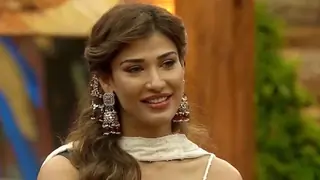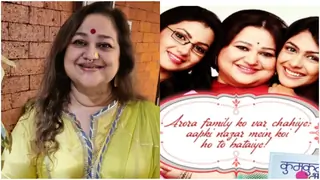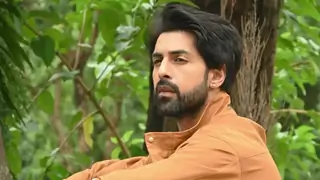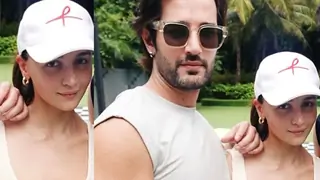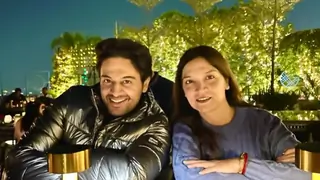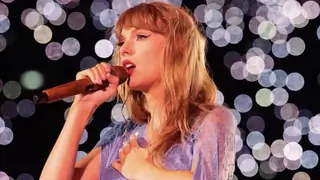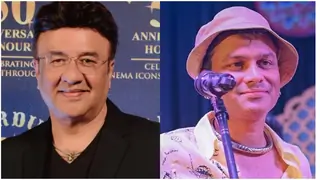RAHUL UNPLUGGED: SANTOOR MEETS PIANO
by
Avinash Kalla
Rahul has emerged from the shadow of his legendary father Pandit Shiv Kumar Sharma with his first fusion album with pianist Richard Clayderman. The young musician is all set to take the santoor to greater heights in the twenty first century with his creativity.
Santoor maestro Pandit Shiv Kumar Sharma's son Rahul has had to go through the paces and is now emerging from the wings of his father to carve an identity for himself in the world of music. Initially, of course, a little help from the father was always welcome.
Back in 1999 Sharma launched Rahul with an album that was appropriately titled Together. " The musical partnership reaches its peak when the performing artists belonging to two generations hail from the same family," says Rahul who has come a long way since he rode piggyback on his dad.
He now has a solo career all his own. His concerts in India and abroad have a following that could match that of his legendary dad. He has performed with the great fusion band Shakti which has the likes of Ustad Zakir Hussain, John Mclaughin and T.N. Vinayakram. And more excitingly, the young man has also composed music for the Hrithik Roshan starrer, Mujhse Dosti Karoge.
Rahul's album The Confluence with pianist Richard Clayderman, recently released by Virgin Records, has been a smash hit among connoisseurs of fusion music. The two who were recently in Delhi to perform in a music festival organized by the Rajiv Gandhi Foundation, are now planning another album together.
The Confluence was a great experience, says Rahul and adds, " When I got a call from Virgin Records for a jugalbandi of the piano and santoor I agreed instantly without even checking out who my accompanying artiste would be."
When he came to know it was the legendary Richard Clayderman, he says he was simply stunned. " I then started working on it, talked to Richard and sent him compositions on CDs and E-mails. Then we met and worked out the finer details. So the album was partly done here and partly in Paris."
" It was a wonderful experience working with talented Rahul, he has a great understanding of music," says Clayderman, internationally considered to be one of the best selling French recording artists and concert performers of all times.
Rahul has other admirers as well. Admirers like tabla maestro, Ustad Zakir Hussain, who says, " It was a treat listening to the duo. Not for a moment did one get the feeling that this youngster was playing alongside one of the greatest international masters of the piano."
Not bad going for the young man who, just four years ago, was an accompanying artiste with his father and was extremely comfortable to remain in his shadow. He gave his first performance when he was 24 but in a few years he has become one of the most sought after musicians not only in India but abroad as well.
Be it the gradual unfolding of a raga through alaap or the rich, complex and intricate permutations and combinations of layakari or the soul-string rendition of an emotional folk melody, Rahul does it all with great panache.
Today, the 28-year-old can match his illustrious father string for string. Earlier he just accompanied him to concerts and was one of the many musicians in the background score. Now he can give a stirring jugalbandi with the senior ustad.
His complex unfolding of a raga and intricate rhythmic patterns of the rendition of folk melodies conjure upon the mind's eye the visions of Kashmir---much like the music of Pandit Shiv Kumar Sharma.
Though purists have always expressed reservations about the shortcomings of the santoor, essentially a Kashmiri folk instrument, to adapt itself to the needs of classical music, Rahul says he is determined to popularise it with the younger generation. " I owe it to my father and grandfather."
Indeed, he does. His grandfather Pandit Umadutt Sharma had the vision of establishing the santoor on the concert platform. Shiv Kumar Sharma achieved that ambition. He did for the santoor, what Bismillah Khan did for the shehnai-- increased the melodic range of the instrument to cover three octaves. He also enhanced its strings to 91 and its bridges to 31, making the instrument more expressive of the bhava innate to the ragas.
And that's the legacy that his son has now inherited. Rahul is all set to take this instrument to greater heights in the twenty first century by adding new dimensions to it with his creativity.










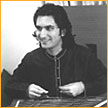
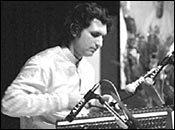 "It is much more challenging composing for a live orchestra. If even one musician plays out of tune or something goes wrong, the song has to be recorded all over again," points out Sharma. "When my father was composing all those years ago, he used live instruments. Now, everything is programmed. I used electronic music in the film, simply because of its superior sound quality." Despite the technical differences, his training under Pandit Sharma, Pandit Chaurasia and Yash Chopra, especially when he sat with them during their music sessions, has helped him now, as a composer. "I learnt how songs are recorded, how singers are trained, how the whole system works," he says. "In fact, I composed a few tunes for Lamhe. I would play them out for my dad, and if he liked it, we would take it to Yashji." Sharma plans to be a more permanent fixture in Bollywood unlike his father, whose last film as a composer was Darr. He has already received several offers, though he has not taken on any new project. "I want to do two or three quality films a year. I would love to work with Subhash Ghai and Karan Johar, simply because they understand music, and it plays such an important role in their films," he says. "Composing for films is thrilling, especially when you see the end product on screen. It is a vast medium and reaches millions of people. Lots of things follow --- fame and money, for example." Given that, Sharma still likes "the impromptu nature of Indian classical music. However much you rehearse, you have to be spontaneous and react to the situation on stage. You have a certain framework within which there are several permutations and combinations," he reveals. "Each time you a play a raga, it sounds different."
"It is much more challenging composing for a live orchestra. If even one musician plays out of tune or something goes wrong, the song has to be recorded all over again," points out Sharma. "When my father was composing all those years ago, he used live instruments. Now, everything is programmed. I used electronic music in the film, simply because of its superior sound quality." Despite the technical differences, his training under Pandit Sharma, Pandit Chaurasia and Yash Chopra, especially when he sat with them during their music sessions, has helped him now, as a composer. "I learnt how songs are recorded, how singers are trained, how the whole system works," he says. "In fact, I composed a few tunes for Lamhe. I would play them out for my dad, and if he liked it, we would take it to Yashji." Sharma plans to be a more permanent fixture in Bollywood unlike his father, whose last film as a composer was Darr. He has already received several offers, though he has not taken on any new project. "I want to do two or three quality films a year. I would love to work with Subhash Ghai and Karan Johar, simply because they understand music, and it plays such an important role in their films," he says. "Composing for films is thrilling, especially when you see the end product on screen. It is a vast medium and reaches millions of people. Lots of things follow --- fame and money, for example." Given that, Sharma still likes "the impromptu nature of Indian classical music. However much you rehearse, you have to be spontaneous and react to the situation on stage. You have a certain framework within which there are several permutations and combinations," he reveals. "Each time you a play a raga, it sounds different." 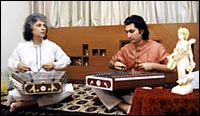 Sharma feels he can use films to introduce classical instruments to a younger audience. "I hope to popularise santoor through the music of Mujhse Dosti Karoge. It will help attract younger generation listeners to my concerts and to classical instruments in general because they are more open to instrumental music." Sharma is also experimenting with fusion, which involves merging Western and Eastern sounds. His next album, Zen, has him playing the santoor, while Kesri Lord plays the electronic keyboard. For this album, Sharma has used the Iranian santoor, which has a completely different tonal quality from the regular Indian one. One of his biggest concerns, Sharma says, is to find ways and means to attract the yuppie crowd to his kind of music. "The problem is people believe they have to be trained to understand classical music, even if it is instrumental. That is not true," he asserts. "You must allow music to touch you. The sound of the santoor, flute or any other instrument grows on you gradually." Just as it grew on him. Although Sharma grew up listening to the santoor and the flute, training to be a classical musician was difficult. "It needed a lot of discipline and was also boring at time," he admits. "I did not know whether I wanted to be a musician or music director or even whether I wanted to have anything to do with music."
Sharma feels he can use films to introduce classical instruments to a younger audience. "I hope to popularise santoor through the music of Mujhse Dosti Karoge. It will help attract younger generation listeners to my concerts and to classical instruments in general because they are more open to instrumental music." Sharma is also experimenting with fusion, which involves merging Western and Eastern sounds. His next album, Zen, has him playing the santoor, while Kesri Lord plays the electronic keyboard. For this album, Sharma has used the Iranian santoor, which has a completely different tonal quality from the regular Indian one. One of his biggest concerns, Sharma says, is to find ways and means to attract the yuppie crowd to his kind of music. "The problem is people believe they have to be trained to understand classical music, even if it is instrumental. That is not true," he asserts. "You must allow music to touch you. The sound of the santoor, flute or any other instrument grows on you gradually." Just as it grew on him. Although Sharma grew up listening to the santoor and the flute, training to be a classical musician was difficult. "It needed a lot of discipline and was also boring at time," he admits. "I did not know whether I wanted to be a musician or music director or even whether I wanted to have anything to do with music." 
